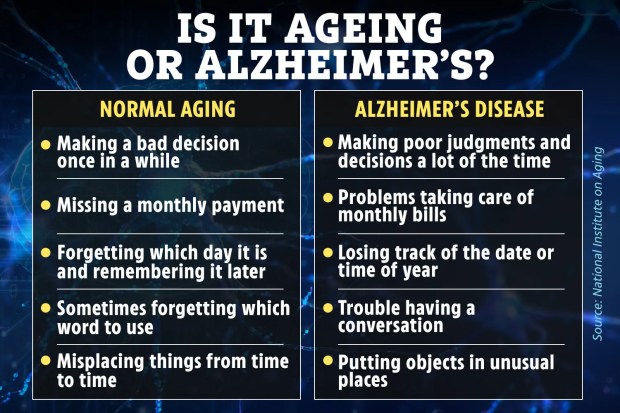A COMMON condition that affects millions of Brits could be responsible for one in three cases of dementia, say researchers.
Treating the condition might delay dementia for a large number of older adults, they add.
There are currently estimated to be 982,000 people living with dementia in the UK and this is projected to rise to 1.4 million by 2040.
Older age, smoking, and excessive alcohol use are among the main risk factors for dementia.
Now a new study, published in JAMA Otolaryngology-Head & Neck Surgery, has revealed hearing loss may be responsible for nearly one-third of dementia cases in older adults.
Researchers found up to 32 per cent of dementia cases over an eight-year period could be attributed to clinically significant hearing loss.
Their findings suggest potential benefits from hearing interventions, such as hearing aids.
Over 18 million adults in the UK are deaf, have hearing loss or tinnitus.
It can be caused by a variety of factors, including age-related changes, exposure to loud noises, genetic conditions, and certain medical conditions or injuries.
As part of the new study, the researchers analysed data from 2,946 adults aged 66 to 90 years, who at the start didn’t have dementia.
They were followed for up to eight years between 2011 and 2019.
“This cohort study suggests that treating hearing loss might delay dementia for a large number of older adults,” the researchers concluded.
Treatment for hearing loss varies depending on the underlying cause and severity.
For many types of hearing loss, hearing aids and assistive devices are used to improve communication.
In some cases, surgery or other medical interventions may be necessary.
How to prevent hearing loss
One of the best ways to prevent hearing loss is to protect your ears from loud noise.
Avoid loud environments or activities as much as possible, wear earplugs or earmuffs when exposed to loud sounds, especially in noisy workplaces or at concerts, and reduce the volume of music, TVs, and other devices to a comfortable level.
Regular hearing check-ups can also help, especially if you have a family history of hearing loss or work in a noisy environment.
And be aware of the warning signs of hearing loss.
The NHS says common signs include:
- difficulty hearing other people clearly and misunderstanding what they say, especially in noisy places
- asking people to repeat themselves
- listening to music or watching TV with the volume higher than other people need
- difficulty hearing on the phone
- finding it hard to keep up with a conversation
- feeling tired or stressed from having to concentrate while listening
If you think your hearing is getting gradually worse, see your GP.
Is it ageing or dementia?

Dementia – the most common form of which is Alzheimer’s – comes on slowly over time.
As the disease progresses, symptoms can become more severe.
But at the beginning, the symptoms can be subtle or mistaken for normal memory issues related to ageing.
The US National Institute on Aging gives some examples of what is considered normal forgetfulness in old age, and dementia disease.
You can refer to these above.
For example, it is normal for an ageing person to forget which word to use from time-to-time, but difficulting having conversation would be more indicative of dementia.
Katie Puckering, Head of Alzheimer’s Research UK’s Information Services team, previously told The Sun: “We quite commonly as humans put our car keys somewhere out of the ordinary and it takes longer for us to find them.
“As you get older, it takes longer for you to recall, or you really have to think; What was I doing? Where was I? What distracted me? Was it that I had to let the dog out? And then you find the keys by the back door.
“That process of retrieving the information is just a bit slower in people as they age.
“In dementia, someone may not be able to recall that information and what they did when they came into the house.
“What may also happen is they might put it somewhere it really doesn’t belong. For example, rather than putting the milk back in the fridge, they put the kettle in the fridge.”

